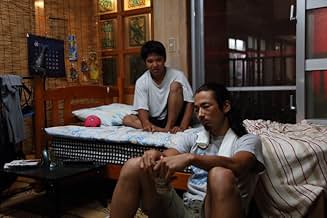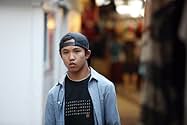Ikari
- 2016
- 2 Std. 22 Min.
IMDb-BEWERTUNG
7,0/10
3556
IHRE BEWERTUNG
Füge eine Handlung in deiner Sprache hinzuA grisly unsolved murder links three seemingly unrelated stories in three different Japanese cities.A grisly unsolved murder links three seemingly unrelated stories in three different Japanese cities.A grisly unsolved murder links three seemingly unrelated stories in three different Japanese cities.
- Auszeichnungen
- 4 Gewinne & 21 Nominierungen insgesamt
Empfohlene Bewertungen
Great Movie (be aware of some scenes might be very disturbing) that does not hold back any punches. You will be angry, sad, happy and disturbed.
Amazing acting, the movie will keep you guessing and questioning yourself. Its a detective movie and multiple love story at the same time. Movie takes place in 3 different Japanese cities with beautiful cinematography. As you sit on the edge of your seat you wonder about the different scenarios that someone faces in life and how you would react to it.
Truly enjoyable, a movie that you need to dedicate your time to it to understand it. Love it..
Amazing acting, the movie will keep you guessing and questioning yourself. Its a detective movie and multiple love story at the same time. Movie takes place in 3 different Japanese cities with beautiful cinematography. As you sit on the edge of your seat you wonder about the different scenarios that someone faces in life and how you would react to it.
Truly enjoyable, a movie that you need to dedicate your time to it to understand it. Love it..
Not to be confused with the Nicolas Cage film with the same movie title, "Rage" follows 3 different story/relationship, each involving 3 main characters within the group, where one of them may end up being the suspect. Of course it involves rage, but also mistrust.
There really aren't that many powerful Japanese films that keep you engaged from start to finish. However, this is one of those rare interesting/powerful films that is definitely worth checking out. It does make you want to keep watching to see how it's going to end and who the suspected killer is that's on the loose.
The film does not hold back at all covering many controversial subjects like homosexuality/gay club prostitution, rape, Okinawa/US Soldier problem. These are actual real-life issues.
This film is definitely not something you watch with your entire family; it will definitely make you feel uncomfortable.
There is nudity and some extremely depressing uncomfortable scenes that is almost too graphic and realistic. I could not help it but cry and REALLY feel for the character, the impact was so big; it will leave you with rage too.
I think the beginning of the film was more powerful than the climax. The climactic scene maybe could have been better... Nevertheless, it is a film that stays with you even days later.
Excellent all-star casting. Aoi Miyazaki really fits the clumsy air-headed prostitute daughter of Ken Watanabe. Satoshi Tsumabuki really put himself out there playing a gay character in the closet. Suzu Hirose, super cute and recently popular actress, playing the girl from Okinawa was quite powerful.
Powerful performances and great music to go with the film.
It is definitely a movie I would put on my top list of Japanese films. Sang-il Lee is definitely also one of the best directors in Japan.
Worth watching!
There really aren't that many powerful Japanese films that keep you engaged from start to finish. However, this is one of those rare interesting/powerful films that is definitely worth checking out. It does make you want to keep watching to see how it's going to end and who the suspected killer is that's on the loose.
The film does not hold back at all covering many controversial subjects like homosexuality/gay club prostitution, rape, Okinawa/US Soldier problem. These are actual real-life issues.
This film is definitely not something you watch with your entire family; it will definitely make you feel uncomfortable.
There is nudity and some extremely depressing uncomfortable scenes that is almost too graphic and realistic. I could not help it but cry and REALLY feel for the character, the impact was so big; it will leave you with rage too.
I think the beginning of the film was more powerful than the climax. The climactic scene maybe could have been better... Nevertheless, it is a film that stays with you even days later.
Excellent all-star casting. Aoi Miyazaki really fits the clumsy air-headed prostitute daughter of Ken Watanabe. Satoshi Tsumabuki really put himself out there playing a gay character in the closet. Suzu Hirose, super cute and recently popular actress, playing the girl from Okinawa was quite powerful.
Powerful performances and great music to go with the film.
It is definitely a movie I would put on my top list of Japanese films. Sang-il Lee is definitely also one of the best directors in Japan.
Worth watching!
RAGE is the second attempt of Lee Sang-il, a Japanese filmmaker of Korean extraction, at adapting Shûichi Yoshida's popular novels, the first being VILLAIN (2010), a critical succès d'estime, both films ostensibly inspect the malaise of a contemporary society built upon a lurid murder case.
A couple is cold-bloodedly liquidated in their home, one year later, three strands (taking place in Chiba, Tokyo, and Okinawa respectively) of narratives are cogently intersected when the police corroborate that the suspect has undergone a facelift and is on the lam, all three story lines will be boiled down to a disintegration between the initially unsuspected and the possible perpetrator, and at the same time, the film meticulously keeps dangling audience with its ever-rotating guessing game.
In Chiba, a girl Aiko (Miyazaki) sloughed from a demimonde background by her father Yohei (Watanabe), strikes a relationship with Tetsuya (Matsuyama), a reticent young man with his past concealed; in Tokyo, a self-dependent gay man Yuma (Tsumabuki), lays his eyes on a reedy Naoto (Ayano) in his usual cruising haunt, after their first penetration, Yuma invites a homeless Naoto to live with him, but the latter remains unforthcoming to a fault; in Okinawa, drifter Shingo Tanaka (Moriyama) is hidden on a small island, after chancing upon a newly-arrived young girl Izumi (Hirose) and a local boy Tatsuya (Sakumoto), their fate will go through shifting sands when an unfortunate tragedy occurs.
Thus, Lee plies audience with 3 candidates of the murderer: Tetsuya, Naoto and Shingo, and cunningly teases viewers with alternate possibilities by dint of coalescing these three's attributes into one photoshopped end product (only one revealing shot in the elevator brazenly belies the eventually misled whodunit), actually, the film is not so much a police procedural as a carefully designed weepie gauging the tenuous degree of trust among human interactions, at least in the paralleled stories of Chiba and Tokyo, the issue of trusting the one you love in spite of his carapace hammers home in a treacly manner albeit two terrific performances from Miyazaki and Tsumabuki, the former blends convincingly her unadulterated immaturity with searing vulnerability whereas the latter, palpably inputs something warm, sympathetic and enthralling to flesh out a character very easily teetering on the brink of homosexual platitude. On the other hand, a transcendent Moriyama steals the limelight in the Okinawa chapter, where the film thrusts its "rage" mythos to the fore and reveals something rotten entrenched within (a slap to both islanders and foreigners), but newcomer Takara Sakumoto is unfortunate shy of charisma to match his rival here.
As a matter of fact, acting is the movie's strongest suit because the script itself takes liberty with many wanton coincidences and artistic license to facilitate plot progress, for example, is it really necessary to bluntly play up certain characters' taciturnity as if this is the only way to keep audience hooked without spilling the beans? Also, for my money, the movie errs on the side of being mawkish and blasé, other than taking its aim at a more rapier-like appraisal of its intriguing premise (cause of the crime), Lee's film is awash with sizzling emotions (cheek by jowl with Ryuichi Sakamoto's attendant score) but in the end of the day, it doesn't reach the echelon of superiority as far as the ultimate impact is concerned.
A couple is cold-bloodedly liquidated in their home, one year later, three strands (taking place in Chiba, Tokyo, and Okinawa respectively) of narratives are cogently intersected when the police corroborate that the suspect has undergone a facelift and is on the lam, all three story lines will be boiled down to a disintegration between the initially unsuspected and the possible perpetrator, and at the same time, the film meticulously keeps dangling audience with its ever-rotating guessing game.
In Chiba, a girl Aiko (Miyazaki) sloughed from a demimonde background by her father Yohei (Watanabe), strikes a relationship with Tetsuya (Matsuyama), a reticent young man with his past concealed; in Tokyo, a self-dependent gay man Yuma (Tsumabuki), lays his eyes on a reedy Naoto (Ayano) in his usual cruising haunt, after their first penetration, Yuma invites a homeless Naoto to live with him, but the latter remains unforthcoming to a fault; in Okinawa, drifter Shingo Tanaka (Moriyama) is hidden on a small island, after chancing upon a newly-arrived young girl Izumi (Hirose) and a local boy Tatsuya (Sakumoto), their fate will go through shifting sands when an unfortunate tragedy occurs.
Thus, Lee plies audience with 3 candidates of the murderer: Tetsuya, Naoto and Shingo, and cunningly teases viewers with alternate possibilities by dint of coalescing these three's attributes into one photoshopped end product (only one revealing shot in the elevator brazenly belies the eventually misled whodunit), actually, the film is not so much a police procedural as a carefully designed weepie gauging the tenuous degree of trust among human interactions, at least in the paralleled stories of Chiba and Tokyo, the issue of trusting the one you love in spite of his carapace hammers home in a treacly manner albeit two terrific performances from Miyazaki and Tsumabuki, the former blends convincingly her unadulterated immaturity with searing vulnerability whereas the latter, palpably inputs something warm, sympathetic and enthralling to flesh out a character very easily teetering on the brink of homosexual platitude. On the other hand, a transcendent Moriyama steals the limelight in the Okinawa chapter, where the film thrusts its "rage" mythos to the fore and reveals something rotten entrenched within (a slap to both islanders and foreigners), but newcomer Takara Sakumoto is unfortunate shy of charisma to match his rival here.
As a matter of fact, acting is the movie's strongest suit because the script itself takes liberty with many wanton coincidences and artistic license to facilitate plot progress, for example, is it really necessary to bluntly play up certain characters' taciturnity as if this is the only way to keep audience hooked without spilling the beans? Also, for my money, the movie errs on the side of being mawkish and blasé, other than taking its aim at a more rapier-like appraisal of its intriguing premise (cause of the crime), Lee's film is awash with sizzling emotions (cheek by jowl with Ryuichi Sakamoto's attendant score) but in the end of the day, it doesn't reach the echelon of superiority as far as the ultimate impact is concerned.
...start with too much blood and a crime but this movie is not a thriller; is about the relationships and the feelings.
Normally people suppose things about the other; sometimes are correct but mostly do not.
The plot has some errors to settle in couple of turns in the story but again, this is not the main goal of this movie.
The acting here is pretty consistent and demonstrate that with a tight budget you can make it possible.
It's a very emotional movie which touches on a few rather uncomfortable, unpleasant and tragic real life subjects. The acting is really good. Unfortunately the plot writing is a bit of a weak point. It's not very creative or believable. Also, some of the protagonists' reactions to the events taking place don't make much sense in terms of realism and only seem to serve for increasing dramatic effect.
Wusstest du schon
- SoundtracksM21 Forgiveness
Written by Ryuichi Sakamoto
Performed by Ryuichi Sakamoto feat. 2Cellos
Courtesy of Sony Music Japan International
Top-Auswahl
Melde dich zum Bewerten an und greife auf die Watchlist für personalisierte Empfehlungen zu.
- How long is Rage?Powered by Alexa
Details
Box Office
- Weltweiter Bruttoertrag
- 13.521.593 $
- Laufzeit2 Stunden 22 Minuten
- Farbe
- Sound-Mix
- Seitenverhältnis
- 2.35 : 1
Zu dieser Seite beitragen
Bearbeitung vorschlagen oder fehlenden Inhalt hinzufügen





























